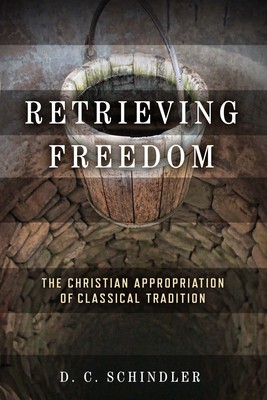
- We will send in 10–14 business days.
- Author: D C Schindler
- Publisher: University of Notre Dame Press
- ISBN-10: 0268203709
- ISBN-13: 9780268203702
- Format: 15.2 x 22.9 x 3.5 cm, kieti viršeliai
- Language: English
- SAVE -10% with code: EXTRA
Reviews
Description
Retrieving Freedom is a provocative, big-picture book, taking a long view of the "rise and fall" of the classical understanding of freedom.
In response to the evident shortcomings of the notion of freedom that dominates contemporary discourse, Retrieving Freedom seeks to return to the sources of the Western tradition to recover a more adequate understanding. This book begins by setting forth the ancient Greek conception--summarized from the conclusion of D. C. Schindler's previous tour de force of political and moral reasoning, Freedom from Reality--and the ancient Hebrew conception, arguing that at the heart of the Christian vision of humanity is a novel synthesis of the apparently opposed views of the Greeks and Jews. This synthesis is then taken as a measure that guides an in-depth exploration of landmark figures framing the history of the Christian appropriation of the classical tradition. Schindler conducts his investigation through five different historical periods, focusing in each case on a polarity, a pair of figures who represent the spectrum of views from that time: Plotinus and Augustine from late antiquity, Dionysius the Areopagite and Maximus the Confessor from the patristic period, Anselm and Bernard from the early middle ages, Bonaventure and Aquinas from the high middle ages, and, finally, Godfrey of Fontaines and John Duns Scotus from the late middle ages. In the end, we rediscover dimensions of freedom that have gone missing in contemporary discourse, and thereby identify tasks that remain to be accomplished. Schindler's masterful study will interest philosophers, political theorists, and students and scholars of intellectual history, especially those who seek an alternative to contemporary philosophical understandings of freedom.
EXTRA 10 % discount with code: EXTRA
The promotion ends in 21d.17:40:00
The discount code is valid when purchasing from 10 €. Discounts do not stack.
- Author: D C Schindler
- Publisher: University of Notre Dame Press
- ISBN-10: 0268203709
- ISBN-13: 9780268203702
- Format: 15.2 x 22.9 x 3.5 cm, kieti viršeliai
- Language: English English
Retrieving Freedom is a provocative, big-picture book, taking a long view of the "rise and fall" of the classical understanding of freedom.
In response to the evident shortcomings of the notion of freedom that dominates contemporary discourse, Retrieving Freedom seeks to return to the sources of the Western tradition to recover a more adequate understanding. This book begins by setting forth the ancient Greek conception--summarized from the conclusion of D. C. Schindler's previous tour de force of political and moral reasoning, Freedom from Reality--and the ancient Hebrew conception, arguing that at the heart of the Christian vision of humanity is a novel synthesis of the apparently opposed views of the Greeks and Jews. This synthesis is then taken as a measure that guides an in-depth exploration of landmark figures framing the history of the Christian appropriation of the classical tradition. Schindler conducts his investigation through five different historical periods, focusing in each case on a polarity, a pair of figures who represent the spectrum of views from that time: Plotinus and Augustine from late antiquity, Dionysius the Areopagite and Maximus the Confessor from the patristic period, Anselm and Bernard from the early middle ages, Bonaventure and Aquinas from the high middle ages, and, finally, Godfrey of Fontaines and John Duns Scotus from the late middle ages. In the end, we rediscover dimensions of freedom that have gone missing in contemporary discourse, and thereby identify tasks that remain to be accomplished. Schindler's masterful study will interest philosophers, political theorists, and students and scholars of intellectual history, especially those who seek an alternative to contemporary philosophical understandings of freedom.


Reviews